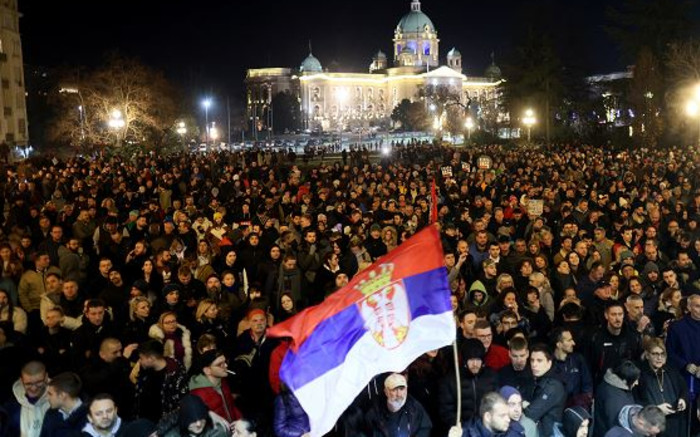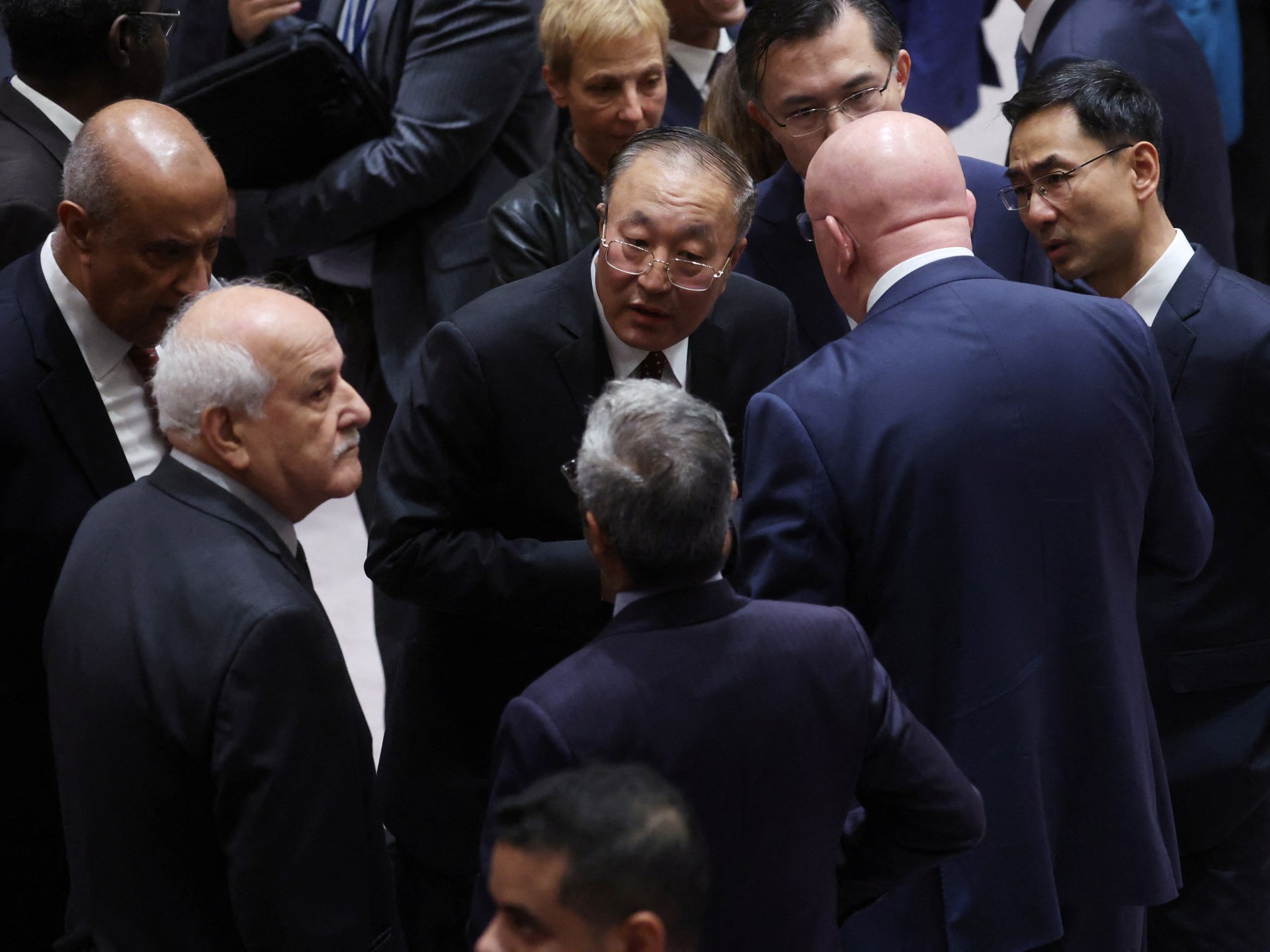
It was the eighth straight day of protests that, unlike Sunday’s demonstrations, were peaceful, although they began with roadblocks in the capital and later a rally outside the State Election Commission building.
Protesters gather in front of the Belgrade City Council building during a demonstration in Belgrade on December 24, 2023, a week after parliamentary and local elections in Serbia. According to state media, Serbia announced plans to repeat elections at 30 polling stations on December 20, just days after nationwide parliamentary and local elections sparked protests and international condemnation over alleged voter fraud. Image: OLIVER BUNIC / AFP
BELGRADE – Thousands gathered outside a police station in Belgrade on Monday evening to support those arrested the day before during protests against alleged voter fraud in Serbia’s recent parliamentary and local elections.
It was the eighth straight day of protests that, unlike Sunday’s demonstrations, were peaceful, although they began with roadblocks in the capital and later a rally outside the State Election Commission building.
“See you tomorrow at 6 p.m.,” Srdjan Milivojevic, a lawmaker from the Serbia Against Violence opposition coalition, said late Monday, signaling that protesters would come together again.
Serbian President Aleksandar Vucic had denounced violence in the capital the previous evening when opposition demonstrators tried to storm Belgrade City Hall and clashed with police.
Vucic said there was evidence that the violence was planned in advance.
Moscow on Monday also accused the West of interference and suggested that foreign actors were trying to foment unrest.
Earlier on Monday, Vucic met the Russian ambassador in Belgrade, Alexander Botsan-Kharchenko, and informed him about Sunday’s events.
Vucic is walking a difficult line between East and West, promising to keep Serbia on the path to European Union membership while also remaining friends with Russia and courting Beijing and Washington.
VOTER DIRECTORY QUESTIONS
Several hundred demonstrators had now blocked the street in the center of Belgrade, where the public administration and the Ministry of Local Self-Government are located.
More obstacles – some in the form of street soccer and volleyball – quickly followed.
The demonstrators, mostly students from the Borba (Struggle) movement, supported the opposition’s allegations of fraud that emerged on December 18, the day after the elections.
They are calling for an audit of the voter roll, claiming it is the source of alleged electoral fraud.
However, a statement from the ministry noted that the register was “one of the most up-to-date records”.
“I was born in 2002 and thought that there would be no need to fight for democracy on the streets like my parents,” 21-year-old politics student Emilija Milenkovic told AFP at a protest on Monday.
“But I have to,” Milenkovic added, wearing the badge of Otpor, the student movement that organized protests against former President Slobodan Milosevic.
A day after the election, Vucic’s party said it had won more than half of the 250 seats in parliament.
The main opposition coalition “Serbia Against Violence” reportedly condemned election fraud and claimed voters from neighboring Bosnia were allowed to cast ballots illegally in the capital.
International observers – including representatives from the Organization for Security and Co-operation in Europe (OSCE) – reported “irregularities,” including “vote buying” and “ballot box stuffing.”
Several Western countries also expressed concerns.
Germany, for example, called the reported allegations “unacceptable” for a country seeking to join the European Union, while a statement from Brussels said Serbia’s “electoral process requires significant improvements and further reforms.”
RUSSIAN SUPPORT
On Saturday, Serbian prosecutors called on police to investigate allegations of fraud.
Vucic was not on the ballot himself in these elections and the only support for him after his Serbian Progressive Party (SNS) declared victory came from Moscow.
“The attempts of the collective West to destabilize the situation in the country are obvious,” Russian Foreign Ministry spokeswoman Maria Zakharova told state news agency RIA Novosti.
She compared the unrest to the 2014 Maidan protests in Ukraine, when protesters ousted a Russian-backed leader from power in a Western-backed effort.
On Monday, one of several demonstrations took place in front of the offices of the State Election Commission in central Belgrade – the scene of several such protests in recent days.
Seven members of the main opposition camp, united under the slogan “Serbia against violence,” also went on hunger strike to demand the annulment of the results and a repeat election.
A lawmaker from the Serbia Against Violence opposition coalition, Radomir Lazovic, told AFP it was still possible that the crisis would end “if they admit the fraud and cancel the elections.”
Lazovic said he was beaten by police during Sunday night’s clashes.






Recent Comments